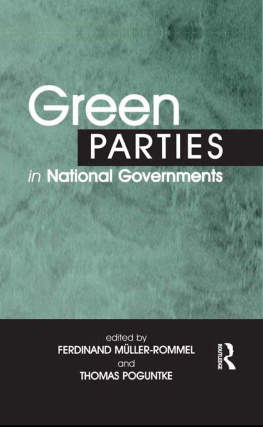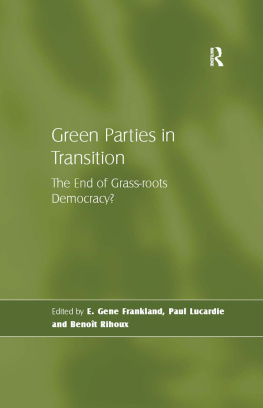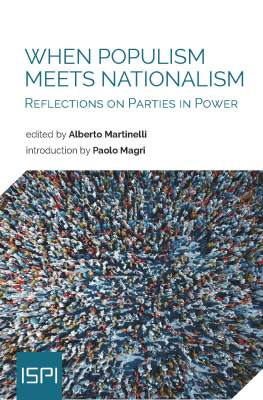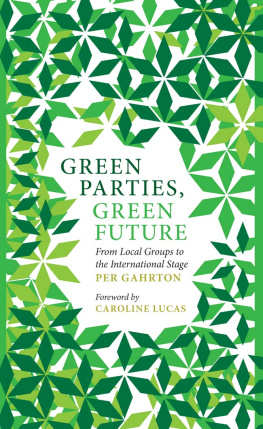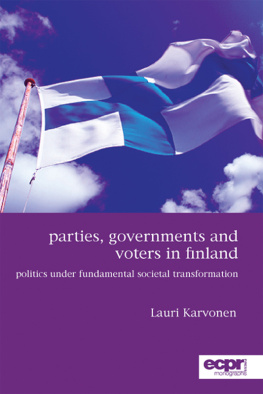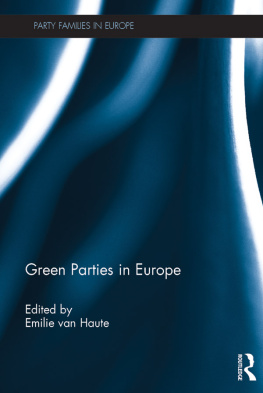Ferdinand Müller-Rommel - Green Parties in National Governments
Here you can read online Ferdinand Müller-Rommel - Green Parties in National Governments full text of the book (entire story) in english for free. Download pdf and epub, get meaning, cover and reviews about this ebook. year: 2002, publisher: Routledge, genre: Politics. Description of the work, (preface) as well as reviews are available. Best literature library LitArk.com created for fans of good reading and offers a wide selection of genres:
Romance novel
Science fiction
Adventure
Detective
Science
History
Home and family
Prose
Art
Politics
Computer
Non-fiction
Religion
Business
Children
Humor
Choose a favorite category and find really read worthwhile books. Enjoy immersion in the world of imagination, feel the emotions of the characters or learn something new for yourself, make an fascinating discovery.
- Book:Green Parties in National Governments
- Author:
- Publisher:Routledge
- Genre:
- Year:2002
- Rating:3 / 5
- Favourites:Add to favourites
- Your mark:
- 60
- 1
- 2
- 3
- 4
- 5
Green Parties in National Governments: summary, description and annotation
We offer to read an annotation, description, summary or preface (depends on what the author of the book "Green Parties in National Governments" wrote himself). If you haven't found the necessary information about the book — write in the comments, we will try to find it.
Green Parties in National Governments — read online for free the complete book (whole text) full work
Below is the text of the book, divided by pages. System saving the place of the last page read, allows you to conveniently read the book "Green Parties in National Governments" online for free, without having to search again every time where you left off. Put a bookmark, and you can go to the page where you finished reading at any time.
Font size:
Interval:
Bookmark:

edited by Susan Baker and Petr Jehli
 ka
kaLocal, National and Global
edited by Christopher Rootes

politics; v. 11, no. 1: Spring 2002)
1. Green movement Europe 2. Green movementEurope Case
studies 3. Europe Politics and government 1989 4. Europe
Politics and government 1989 Case studies
I. Title II. Poguntke, Thomas
324.4087
Thomas Poguntke.
Included bibliographical references and index.
ISBN 0-7146-5264-4 (cloth) ISBN 0-7146-8240-3 (paper)
1. Political partiesEurope, WesternCase studies. 2. Coalition governmentsEurope,
WesternCase studies. 3. Green movementEurope, WesternCase studies. I.
Mller-Rommel, Ferdinand. II. Poguntke, Thomas.
324.21094dc21
a retrieval system or transmitted, in any form or by any means, electronic, mechanical,
photocopying, recording or otherwise without the prior written permission of the
publisher of this book.
Font size:
Interval:
Bookmark:
Similar books «Green Parties in National Governments»
Look at similar books to Green Parties in National Governments. We have selected literature similar in name and meaning in the hope of providing readers with more options to find new, interesting, not yet read works.
Discussion, reviews of the book Green Parties in National Governments and just readers' own opinions. Leave your comments, write what you think about the work, its meaning or the main characters. Specify what exactly you liked and what you didn't like, and why you think so.

